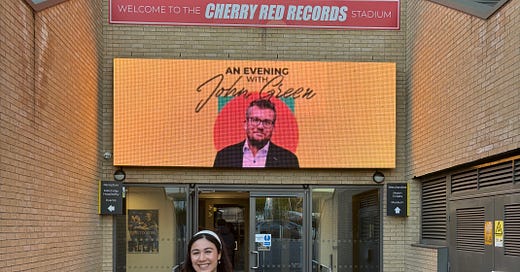Good morning (or afternoon) and Good Friday, dear reader. I'm jet lagged, my hair looks great, and I am getting absolutely hyped for Easter weekend. How are you doing?
I've spoken briefly on this Substack about how much I love Easter. I find it to be the most meaningful season of the Christian holiday calendar—and given that the whole religion is based on on Jesus Christ being the savior who died on the cross for us, this makes sense.
But inherently, it's an odd form of celebrating because it includes such somber remembering. Currently, we're in 'Holy Week'—the days leading up to Easter that remember the persecution, betrayal, crucifixion, and death of Jesus. He was the kindest, most forgiving, most holy person to ever walk the earth, and yet he died a gruesome death.
Good Friday is the day during Holy Week when we ponder the crucifixion; in essence, it is a day for remembering tragedy. Jesus' death was the death of a loving, perfect savior, one who sacrificed themselves for the redemption of humanity. But since it is through his death and resurrection that we get to enjoy salvation and call ourselves Christians, we now remember and label the death as 'Good'.
From the outside, this whole line of thinking can seem very odd. It seems emo. Maybe a little heavy metal. Perhaps slightly religiously fanatic. But a little bit of drama makes life all the more wonderful.
I find great hope in the story of Holy Week. It claims that death is not the end. In a literal way, death was not the end for Jesus—he returns, and we have the gift of his legacy and presence in our lives forevermore. But in a more metaphorical sense, the story of Jesus reminds us that hope and redemption are possible in every corner of our lives.
I think about all the big issues in the word that make me feel scared and helpless. Corrupt CEOs. Crooked politicians. The careless abuse and pollution of our natural world. Poverty. Cruel discrimination. Etc, etc, etc... sadly, I'm sure your brain is already extending the list of horrible things in this world to complain about. There is an unfortunate abundance of evil at large.
And that's just thinking about things on the macro-level. We each also have things that are difficult to face in our personal lives. Rent and bills that feel painfully heavy on our wallets. Difficult relationships and heartbreak. Unforeseen and painful illness. Crippling insecurities and anxieties.
If you think about it all at once, it feels only natural to throw your hands up and give up. To say, “It's all just too much to handle.”
But giving up feels scary and embarrassing, and so most of us avoid thinking about these things altogether. A quiet little lie whispers in our ear: “If I don't think about all the problems, then I won't be overwhelmed by them, and then I won't be tempted to give up.”
The most common method of avoidance comes in the form of a well-loved buffer. For me, it's a quick, giggly scroll through TikTok. For others, it might be throwing themselves into the intricate challenges of work, or keeping their social calendar booked and busy. Anything to keep the mind distracted.
These methods are usually effective, but when their potency runs out, we might be inclined to reach for something stronger—something to drink, or something to smoke, or some other indulgence.
Let me pause here and emphasize: none of these activities are inherently wrong! A full life usually does include exciting work, meaningful friendships, and an abundance of treats. I'm not even against the idea of distraction. Lord knows that sometimes, all I need after a long day is a little bit of comforting TV. But distraction alone is not the answer for how to thrive in a difficult world.
As with anything in life, intention is everything.
If option 1 is: think too much about the world, get overwhelmed, and give up,
And option 2 is: distract yourself so much that you never need to think about the world’s tragedies, but instead get stuck in a loop of living an un-grounded, unsatisfying half-life,
Then I want to pursue option 3: truly ponder and think about the world with all of its chaos and beauty, and still choose to participate, engage, and help in the best and healthiest way I can.
For me, option 3 is only possible with Jesus (or, at the very least, a belief that there is a good force at work in the world).
The goodness of God is the ultimate encouragement. With Jesus, I can look at the injustice in the world and know that there's a greater being out there who also cares. I know that my lifetime is just a small window in the greater story of humanity—that even if I don't see full redemption come to fruition while I'm alive, the fight for good will continue on. I know that in the long run, victory is guaranteed because Jesus died on the cross and defeated the grave.
Death is not the end. Not for Jesus, not for us, not for that childhood dream that you gave up on years ago, not for that dysfunctional family dynamic that you can hardly imagine being any different... and who doesn't love a comeback story?
I know that a lot of times, this line of thinking can still seem very lofty and far-fetched. But in my mind, I don’t want to give hopelessness the chance to take root in my life. There are far too many people suffering out there who still need help, and far too many children who need an older sister looking out for them. And so I will continue to cling to this great faith-based story that sustains my sense of everlasting hope.
Yesterday, I had the wonderful opportunity to see John Green speak at an event promoting his new book, Everything is Tuberculosis. While I’m not typically a nonfiction girl, I love this book. It uses this deadly disease as lens by which to examine the tragic injustices of our world, both gravely examining what humanity has done wrong and yet championing the hope that we can do better.
John and the event host discussed writing, tuberculosis, (English) football, and more. It was meaningful and funny and encouraging. The event carried this same sense of profound hope that I am pondering this Holy Week. It was hosted in the AFC Wimbledon hospitality lounge, and while I know very little about football (I’m referring to the English kind, but I also don’t really know anything about American football), I quickly learned that it was the perfect space to hold this event.
Besides John Green’s obvious passion as a fan of the club, AFC Wimbledon is in the middle of its own comeback story that makes it one of the most inspirational fairy tales of the sports world. When the club’s wealthy owner moved the team to another city, thus abandoning the team’s local fan base, changing the name, and completely betraying the essence of what made the team themselves, the Wimbledon locals did not give up. Instead, they started a grassroots movement to restart the club from scratch.
It hurt to have the club as they knew it ripped away from them. But their hope empowered a new beginning, and like with any resurrection, there was profound blessing to be found in this part of the story. AFC Wimbledon now exists with majority ownership not in the hands of distant billionaire shareholders, but in The Dons Trust, a democratic group of fans. In other words, it is a fan-owned football club, which makes it a rarity in a world where sport teams are usually influenced by wealth and business machinations.
So, in its death and resurrection, AFC Wimbledon has come back to life as something even more beautiful than before. It is a bright, shining example of a ‘phoenix club’.
(Are you getting how this is also the story of Easter?)
In Jesus’s death and resurrection, he was able to return even more glorious than before. His 3-day journey into death itself gave humanity the sanctification we so desperately needed.
The Good Friday story teaches us to have hope in even the darkest of situations. Just as the fans of AFC Wimbledon did not give up hope when all seemed lost, so we must continue to hope for goodness to prevail in a world that seems topsy-turvy with injustice. Sometimes, death is just part of the middle of the story—but it is certainly not the end.
So, on this Good Friday, is there anything that you have lost hope on? Any dreams you have let die? Any flames of optimism you have let extinguish?
As winter melts into Spring and we remember Christ who came back from the grave, let yourself also dare to let your hope resurrect.






